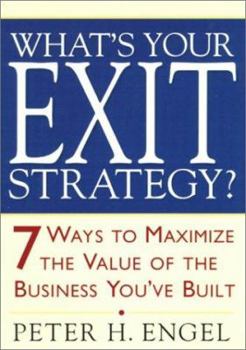What's Your Exit Strategy? Seven Ways to Maximize the Value of the Business You've Built
How entrepreneurs plan to leave their businesses should define how they run them, who they employ, and how they fund them. The concept of formalizing an exit strategy is never thought about, but it could save money. Here are seven main exit strategies to consider.
Format:Hardcover
Language:English
ISBN:0761519971
ISBN13:9780761519973
Release Date:August 1999
Publisher:Prima Lifestyles
Length:256 Pages
Weight:1.20 lbs.
Dimensions:1.0" x 6.4" x 9.3"
Customer Reviews
2 ratings
VERY helpful for an entrepreneur
Published by Thriftbooks.com User , 19 years ago
I guess I didn't really grasp how helpful a specific exit strategy is until I read this book. It is surprising how little literature is out there about this subject! I am on my second startup, and Engel's book has me thinking MUCH more clearly about how a specific exit plan affects all facets of strategy, from marketing, to product development, to financial bookkeeping, to corporate governance. In particular, understanding that our company's end goal is to sell to a strategic buyer has helped us: -focus product development so that software code and user interface can easily be integrated with that of our targeted buyers--we avoided using different programming languages and user interfaces. -focus our sales efforts on gaining the largest customer base possible (since that's where our real value to the strategic buyer lies) versus just capturing immediate revenues through higher pricing (and thus fewer users), even if that means realizing lower margins in the short run; doing so will greatly enhance our sell-ability and attractiveness to our buyers--the big sell. -focus cultivation of the RIGHT board of advisors. Currently, we rely on a group of solid, generally well connected, business men and women. Understanding our end goal better prods us to seek out one or two individuals who can augment our board, who are connected with the specific companies to whom we seek to sell, and to that industry at large. This should help us in guiding product development, initiating negotiations, and increasing our end value to the strategic buyer. Much like Steven Covey's habit of "Starting with the end in mind," this book emphasizes how to do so in the context of strategic business planning. The book is very readable, has a few spots of humor, and is one I would highly recommend for anyone with a job. Not sure I would pay $43 in hardcover for it...that seems steep to me...I got mine from a library sale.
Do You Even Have One?
Published by Thriftbooks.com User , 23 years ago
Engel offers seven ways "to maximize the value of the business you have built." His key point seems to be that, whether or not you plan to "exit" now or within the next 12-18 months, you still need to maximize and quantify the value of your company. He offers a wealth of information and insights which suggest HOW. For owners of privately-held companies, Engel's book will walk them through the process, defining the exit strategies and approaches to them, and then review their implications for funding, income building, personnel, corporate culture, expansion planning, and other matters encountered along the way. Here are the seven strategies:* Selling to a strategic buyer* Selling to a financial buyer* Going public* Liquidating your assets (that is, milking your business)* Enforced liquidation* Managing for lifeEngel examines each of these seven strategies (or options) in detail. I am reminded of what Prime Minister Begin said, after formulating the accords with President Sadat at Camp David when asked how their agreement had been reached. "We did what all wise men do. We began at the end." Engel expresses a similar thought in the Conclusion: "The exit strategy, then, should be the first and last piece of the business puzzle every entrepreneur assembles. It ought to be the first decision entrepreneurs make because it has as much impact on their future as anything else -- and it will be their last decision because eventually they must exit." Why wait? Plan the exit strategy now. Engel explains HOW.





